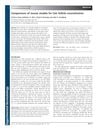
Search
for
Sort by
Research
150-180 / 1000+ results

research Acne-Associated Syndromes
Acne is linked to inflammation and insulin resistance, and is associated with various syndromes that require different treatments.

research The Effect of 5α-Reductase Inhibition with Dutasteride and Finasteride on Semen Parameters and Serum Hormones in Healthy Men
Dutasteride and finasteride may reduce sperm count and volume but don't affect movement or shape; effects are reversible after stopping.

research The Role of Androgen and Androgen Receptor in Skin-Related Disorders
Targeting androgen receptors could be a promising way to treat skin disorders with fewer side effects.

research Finasteride
Finasteride treats enlarged prostate, shrinks it, improves urination, but may cause sexual dysfunction and isn't for women or children.

research What Do We Know About Phytotherapy of Benign Prostatic Hyperplasia?
Some plant-based treatments can help with benign prostatic hyperplasia symptoms, but more research is needed to confirm their safety and effectiveness.
research Management of Hirsutism
Antiandrogens, particularly flutamide and CPA, are most effective for treating hirsutism, with long-term use needed for best results.

research Emotional Consequences of Finasteride: Fool’s Gold
Finasteride can cause serious emotional side effects; doctors should check patients' mental health history before prescribing.

research Androgenetic Alopecia: In Vivo Models
Stump-tailed macaque best for researching hair loss causes and treatments.

research Comparisons of Mouse Models for Hair Follicle Reconstitution
The flap assay grows the most natural hair but takes the longest, the chamber assay is hard work but gives dense, normal hair, and the patch assay is quick but creates poorly oriented hair with some issues.

research Exposure of Xenopus Laevis Tadpoles to Finasteride, an Inhibitor of 5-Alpha Reductase Activity, Impairs Spermatogenesis and Alters Hypophyseal Feedback Mechanisms
Finasteride exposure harms tadpole reproduction and hormone balance.

research The New Paradigm for Androgenetic Alopecia and Plant-Based Folk Remedies: 5α-Reductase Inhibition, Reversal of Secondary Microinflammation, and Improving Insulin Resistance
Plant-based remedies may treat hair loss by reducing inflammation and improving insulin resistance.

research An Asian Traditional Herbal Complex Containing Houttuynia Cordata Thunb, Perilla Frutescens Var. Acuta, and Green Tea Stimulates Hair Growth in Mice
The Asian herbal mix with Houttuynia cordata, Perilla frutescens, and green tea helped grow hair in mice.

research Baldness May Be Caused by the Weight of the Scalp: Gravity as a Proposed Mechanism for Hair Loss
Baldness might be caused by scalp weight pressing on hair follicles.

research Three-Dimensional Proteome-Wide Scale Screening for the 5-Alpha Reductase Inhibitor Finasteride: Identification of a Novel Off-Target
Finasteride may affect PNMT, causing side effects.

research Dissolvable Microneedles Loaded with Ginsenoside Rg3 Liposome: A Transdermal Delivery Approach for Alopecia Treatment
Dissolvable microneedles with Ginsenoside Rg3 can help treat hair loss by improving drug delivery and stimulating hair growth.

research Edible Seeds From Cucurbitaceae Family as Potential Functional Foods: Immense Promises, Few Concerns
Edible seeds from the Cucurbitaceae family like pumpkin and watermelon seeds are nutritious and may have health benefits, but eating too much can cause side effects.

research Post-Finasteride Syndrome and Post-SSRI Sexual Dysfunction: Two Sides of the Same Coin?
PFS and PSSD are similar conditions with persistent sexual dysfunction after stopping medication.

research Therapeutic Experience with Oral Finasteride for Androgenetic Alopecia in Female-to-Male Transgender Patients
Finasteride effectively treats hair loss in transgender men with few side effects.

research The Androgen Receptor and Its Use in Biological Assays: Looking Toward Effect-Based Testing and Its Applications
Scientists have developed a new method to detect steroid abuse in athletes using cell-based tests, which could be the future of anti-doping methods.

research The Beneficial Effects of Pumpkin (Cucurbita Pepo L.) Seed Oil for Men's Health
Pumpkin seed oil may improve prostate health, bladder control, and hair growth in men.

research A Comprehensive Review on Phytochemistry and Pharmacological Effects of Stinging Nettle (Urtica dioica)
Stinging nettle has compounds that help with joint pain, arthritis, and prostate issues.

research Harnessing the Power of Rosemary and Kalonji Seeds for Hair Health: A Review
Rosemary and kalonji seeds can improve hair health and treat hair conditions.

research Environmental Factors and Puberty Timing: Expert Panel Research Needs
Chemicals and body size might change when puberty starts and progresses, but more research is needed to confirm this.

research Balding Hair Follicle Dermal Papilla Cells Contain Higher Levels of Androgen Receptors Than Those From Non-Balding Scalp
Cells from balding scalps have more androgen receptors than cells from non-balding scalps.

research Androgenetic Alopecia: An Evidence-Based Treatment Update
Effective treatments for male pattern baldness include oral finasteride and topical minoxidil, while topical minoxidil is best for female pattern baldness.

research Functional Complexity of Hair Follicle Stem Cell Niche and Therapeutic Targeting of Niche Dysfunction for Hair Regeneration
Understanding how hair follicle stem cells work can help find new ways to prevent hair loss and promote hair growth.

research Hair Loss and Herbs for Treatment
Herbs can potentially treat hair loss by inhibiting a key enzyme and promoting hair growth, and deficiencies in zinc, biotin, and iron are linked to hair loss.

research Increased Insulin Sensitivity by Metformin Enhances Intense-Pulsed-Light-Assisted Hair Removal in Patients with Polycystic Ovary Syndrome
Taking metformin with intense-pulsed-light therapy improves hair removal for people with PCOS.

research Hair Restoration in Androgenetic Alopecia: Looking Beyond Minoxidil, Finasteride, and Hair Transplantation
Alternative treatments show promise for hair growth beyond traditional methods.